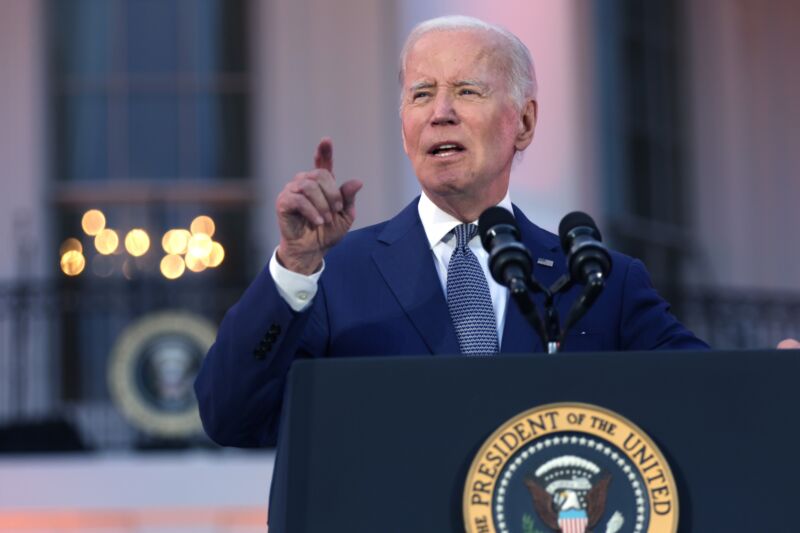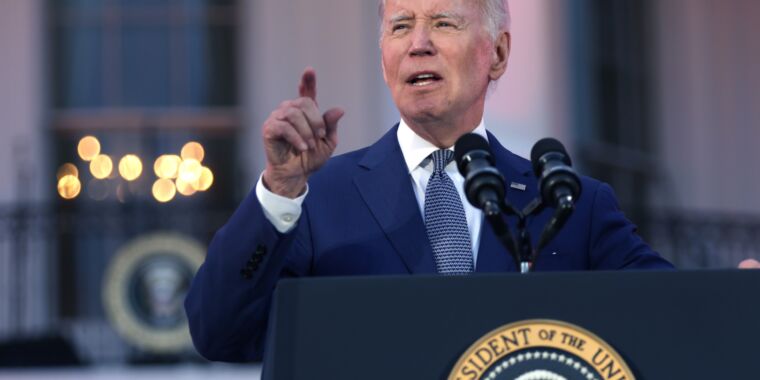
Getty Images | Alex Wang
President Joe Biden this week criticized cable TV companies for imposing “junk fees,” while the Federal Communications Commission proposed new rules to address the hidden fees charged by cable and satellite video providers.
“My government’s top priority is to reduce the cost of living for the middle class, and that includes cracking down on corporate use of junk fees to hide the true cost from families, who end up paying more as a result.” Biden said in a statement. on Tuesday.
As Biden noted, the FCC “proposed a new rule that would require cable and satellite TV providers to provide consumers with the all-inclusive price up front for the service they offer.” The proposed rule would force companies like Comcast, Charter Spectrum and DirecTV to publish more accurate prices.
Biden continued:
Too often, these companies hide additional junk charges on customer bills disguised as “TV broadcast” or “regional sports” fees for which no additional services are actually paid. These costs really add up: According to one report, they increase customer bills by nearly 25 percent of the price of the basic service.
FCC President Jessica Rosenworcel first introduced price transparency rules for the TV services offered by cable and satellite companies in March. That effort took a step forward Tuesday when the committee approved a Notice of Proposed Rulemaking (NPRM) seeking public comment on rules that would force video providers to offer accurate pricing in ads.
Misleading fees for “Broadcast TV” and “Regional Sports”.
“Consumers who choose a video service based on an advertised monthly price may be surprised by unexpected charges associated with video programming costs that significantly increase the amount of the bill,” the NPRM said. The cable and satellite television companies’ practice of listing “Broadcast TV” and “Regional Sports Network” fees separately from the advertised price may be misleading and may be interpreted as a tax or fee imposed by the government, rather than of a service fee imposed by the company. increase,” and make it difficult for customers to compare prices between providers, the FCC said.
The roll is available here and comments are accepted for 60 days after the NPRM is published in the Federal Register. The FCC said its proposal “would require cable operators and DBS [direct broadcast satellite] providers to clearly and conspicuously display the total cost of video programming services.”
The FCC is also seeking comment on whether it has the authority to impose similar requirements on other types of video providers. But Rosenworcel reportedly said at a congressional hearing that the FCC’s authority under US law does not extend to streaming services.
The FCC has already voted to require broadband providers to display labels with exact prices and other information about Internet subscriptions. As we reported last week, Comcast complained to the FCC that it’s too difficult to list all of its monthly broadband rates and that it wants the commission to change broadband label rules before they go into effect.
A transparency rule for TV prices would force Comcast to be fairer in its advertised prices for video services as well. The combined cost of Comcast’s Broadcast TV and Regional Sports Network can add about $40 to a customer’s monthly TV bill.
The advertised price should be the price you pay
The FCC is still working at a 2-2 partisan deadlock as the Senate refuses to confirm Biden nominee Gigi Sohn. Biden tries again with Democrat Anna Gomez’s nomination.
The FCC had to implement broadband labeling rules in a 2021 law passed by Congress, but is not facing a similar requirement to crack down on deceptive TV pricing. While the NPRM on TV pricing transparency has been approved by the FCC, Rosenworcel may ultimately need a Democratic majority to enforce strict pricing rules for TV services after the comment period is over.
“Consumers deserve to know exactly what they are paying for when they sign up for a cable or satellite broadcast,” Rosenworcel said Tuesday. “No one likes surprises on their bill. The advertised price for a service should be the price you pay when your bill comes in.”
Currently, TV providers are hiding “a bunch of junk costs separate from the top service price,” Rosenworcel also said. While the FCC probably won’t try to regulate streaming services’ advertised prices, Rosenworcel said her proposed rules would make it easier to compare traditional pay-TV prices with online options.
“Increases in programming fees should not be described as a tax, fee or surcharge,” she said. “The ‘all-in’ pricing format we’re proposing today would empower consumers to make informed choices by making it easier to compare against competing providers and compare programming costs with alternative programming providers, including streaming services.”

